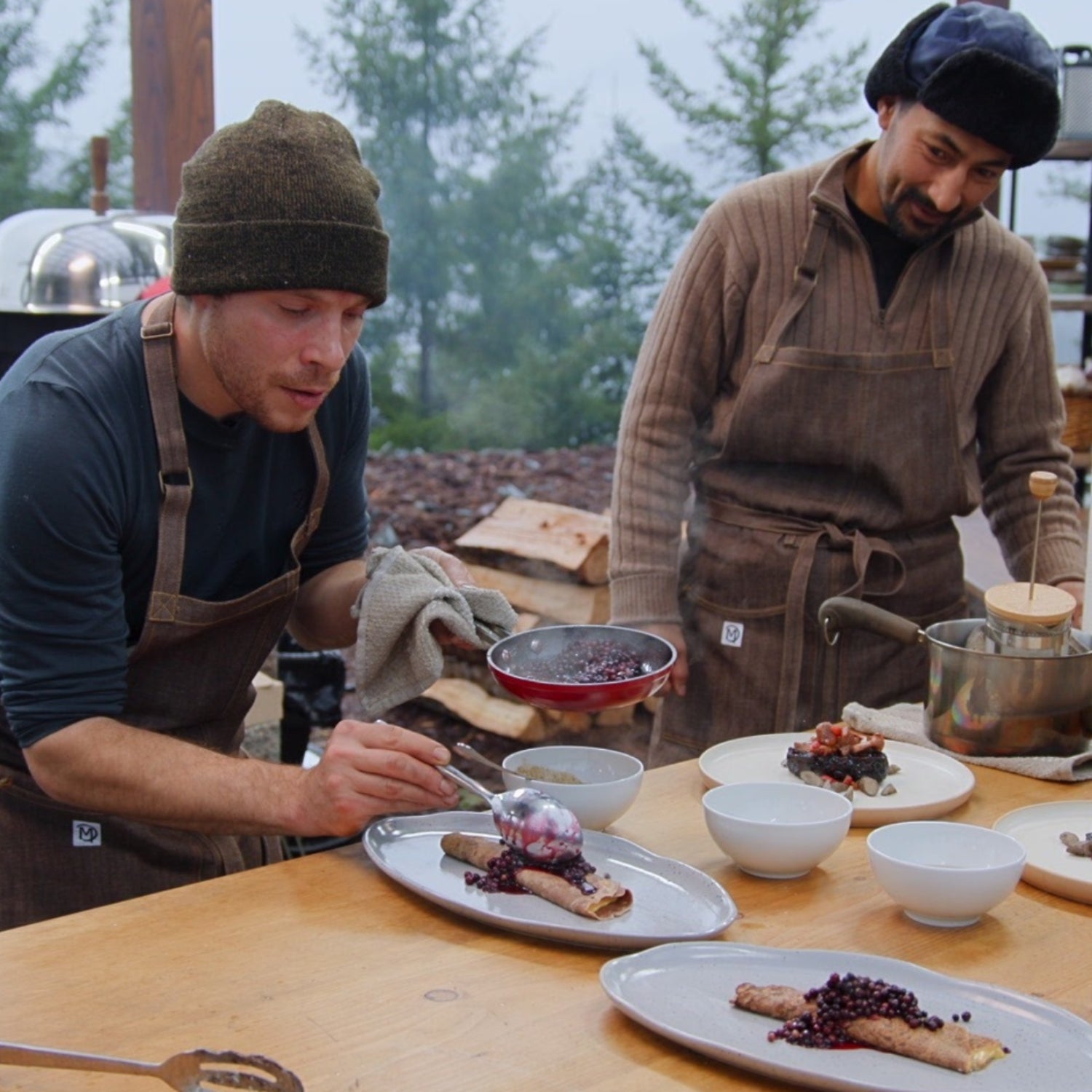The restaurant industry never sleeps. And seemingly so, neither do the employees: when the doors open, orders begin to roll in and the sounds of the kitchen come alive, pots clicking, fires burning, and the oven timer ringing off the chain. If something goes awry, chefs internalize every problem in the kitchen—and after twelve-hour shifts, six nights in a row, their lives outside the kitchen take a toll for the worse. For many, this wake-up call leads them in search of a new challenge, one that doesn’t force them to choose between their passion and well-being.
In Chefs vs. Wild, a new extreme cooking show debuting on Hulu today, 16 seasoned chefs are taken out of the kitchen into the wild terrain of the Sunshine Coast of British Columbia, Canada. In each episode, two new contestants are paired with highly-trained survivalists and left in the wilderness for 48 to 96 hours to forage ingredients for a three-course meal prepared for judges. Many of the chefs have been recognized by the prestigious James Beard Foundation and Michelin Guide, while others run successful culinary-based businesses with years of extensive experience. It’s hosted by Kiran Jethwa, a chef, restauranter, media personality, and creator of the YouTube channel Fearless Food, where he seeks peculiar ingredients and turns them into delicacies. Diversity and inclusion of food culture are the basis of Jethwa’s culinary philosophy, and it’s steadfast in casting chefs and survivalists on the show.
Jethwa’s cohost is Valerie Segrest, an expert in Native food of the Pacific Northwest. In a commentary to a contestant, Segrest says, “Everything that we need to survive and thrive is on the land all around us, at all times.” In the days of climate change awareness, this testament and ideology is a constant notion in native culture. In addition to Segrest, the season is weaved with native representations, from the chefs to the survivalists, including Robin Lafreniere of the Lake Manitoba First Nation and a member of the Anishinaabe First Nations tribe; contestant and chef Nico Albert from a line of Cherokee Nation descent, who teaches Indigenous food culture and food sovereignty; and Jordyn Burnouf, a survivalist who is Cree and Métis from the community of Ile-á-la Crosse, a Black Lake First Nation member.
Somewhat unique to Chefs vs. Wild is the lack of prize money for the winner. With cooking shows across all digital platforms offering sizeable monetary gains, why would a chef participate in a show with extreme cooking conditions and no winnings at the end? As a chef myself, I think they’re after validation–to prove their skill set is world-class and confirm their culinary knowledge.
There’s a high that comes from validation for many chefs, whether that’s through recognition, awards, cult followings, or media write-ups. However, when you reach a personal peak, the ego is a giant that can’t be knocked down. This competition challenges this ego, and asks the contestants: Are you as good as you think you are? Any good chef knows that there’s room for error in the kitchen; any great chef knows how to troubleshoot a problem and think “on the fly.” While forcing contestants to use these skills, Chefs vs. Wild also challenges their mind, body, and soul. Long days of prep are expected in a kitchen, but when you’re in the wilderness against the elements, you must access a new level of focus and endurance and yield to the authority of your survivalist—which I noticed was difficult for some chefs.
When you are used to leading, it’s hard to let other people lead, even if it’s in your best interest. Yet, in many cases, the most successful chefs on the show were the ones that listened and took sound advice from their counterparts. This is what makes Chefs vs. Wild a refreshing break from the typical cooking competition show: it tests the boundaries of endurance, strength, and culinary knowledge of the chefs and survivalists involved, yet also provides a platform to show each contestant’s true colors when forced to survive in a climate they’re not accustomed to. And while the contestants are the ones conceptualizing the dishes and cooking the food, the survivalists are also as imperative to accomplishing the goal at hand—those who realize that are the ones who are the most successful in the competition. After all, as a chef, you are nothing without your team.


